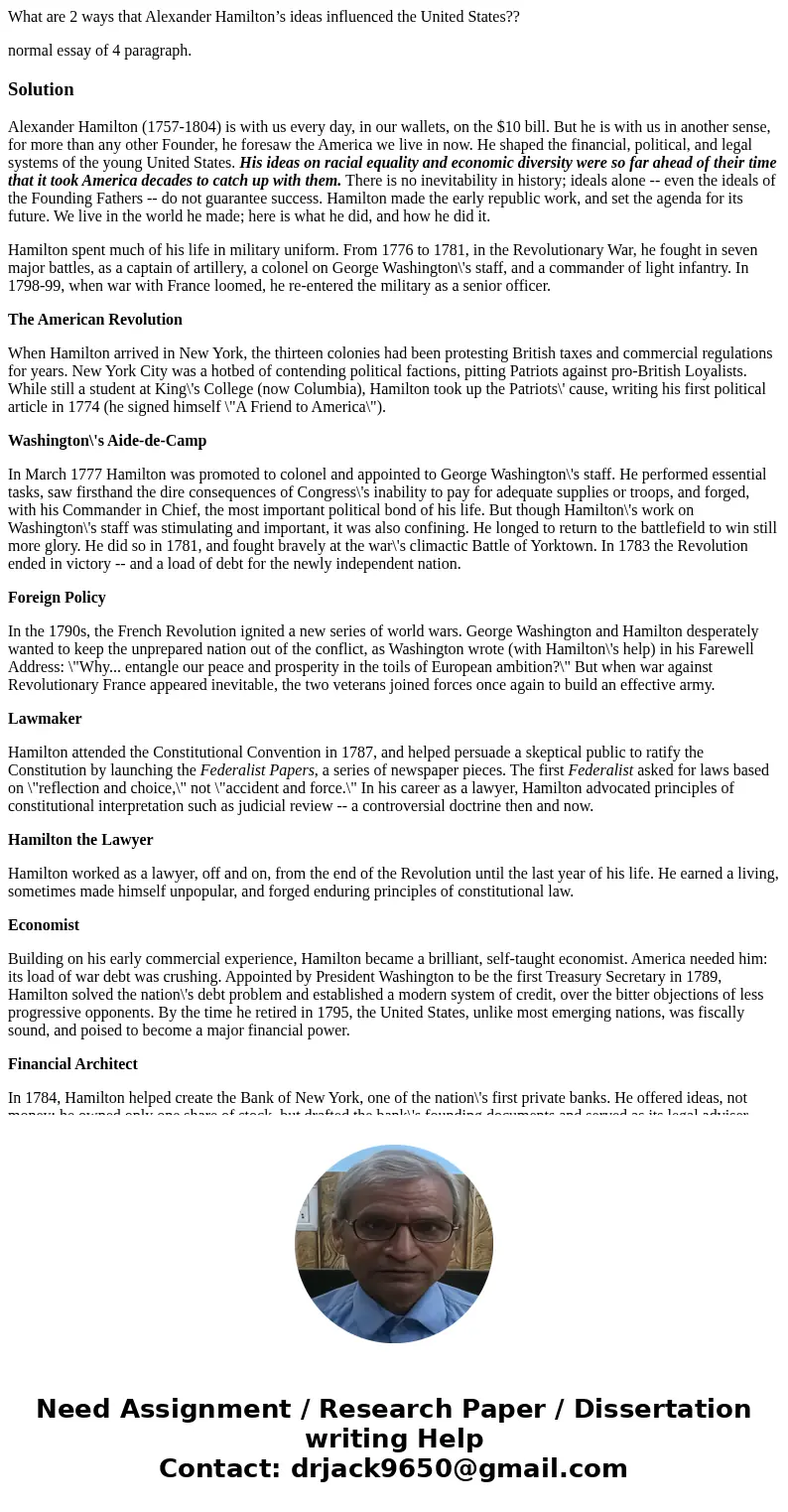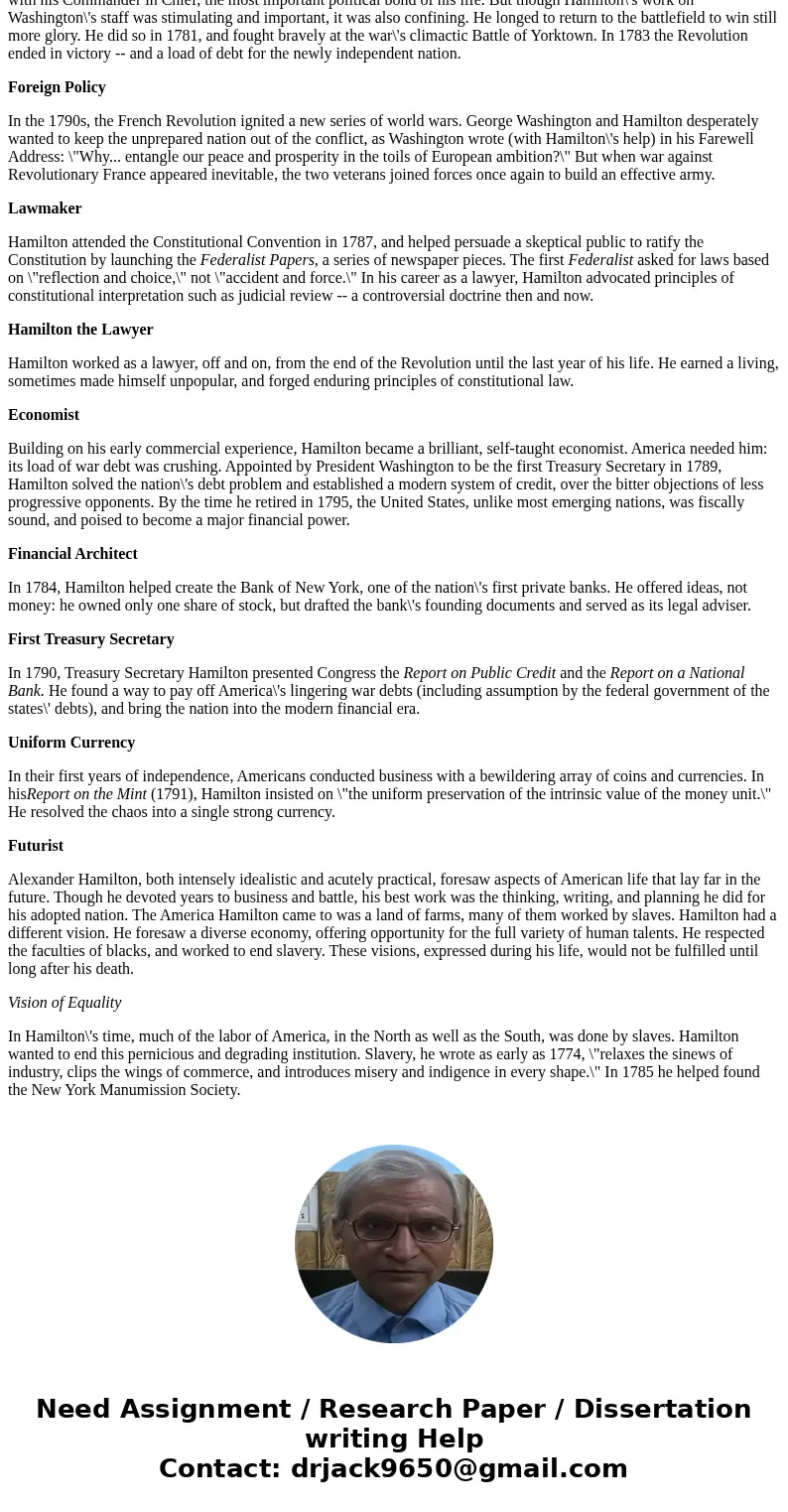What are 2 ways that Alexander Hamiltons ideas influenced th
What are 2 ways that Alexander Hamilton’s ideas influenced the United States??
normal essay of 4 paragraph.
Solution
Alexander Hamilton (1757-1804) is with us every day, in our wallets, on the $10 bill. But he is with us in another sense, for more than any other Founder, he foresaw the America we live in now. He shaped the financial, political, and legal systems of the young United States. His ideas on racial equality and economic diversity were so far ahead of their time that it took America decades to catch up with them. There is no inevitability in history; ideals alone -- even the ideals of the Founding Fathers -- do not guarantee success. Hamilton made the early republic work, and set the agenda for its future. We live in the world he made; here is what he did, and how he did it.
Hamilton spent much of his life in military uniform. From 1776 to 1781, in the Revolutionary War, he fought in seven major battles, as a captain of artillery, a colonel on George Washington\'s staff, and a commander of light infantry. In 1798-99, when war with France loomed, he re-entered the military as a senior officer.
The American Revolution
When Hamilton arrived in New York, the thirteen colonies had been protesting British taxes and commercial regulations for years. New York City was a hotbed of contending political factions, pitting Patriots against pro-British Loyalists. While still a student at King\'s College (now Columbia), Hamilton took up the Patriots\' cause, writing his first political article in 1774 (he signed himself \"A Friend to America\").
Washington\'s Aide-de-Camp
In March 1777 Hamilton was promoted to colonel and appointed to George Washington\'s staff. He performed essential tasks, saw firsthand the dire consequences of Congress\'s inability to pay for adequate supplies or troops, and forged, with his Commander in Chief, the most important political bond of his life. But though Hamilton\'s work on Washington\'s staff was stimulating and important, it was also confining. He longed to return to the battlefield to win still more glory. He did so in 1781, and fought bravely at the war\'s climactic Battle of Yorktown. In 1783 the Revolution ended in victory -- and a load of debt for the newly independent nation.
Foreign Policy
In the 1790s, the French Revolution ignited a new series of world wars. George Washington and Hamilton desperately wanted to keep the unprepared nation out of the conflict, as Washington wrote (with Hamilton\'s help) in his Farewell Address: \"Why... entangle our peace and prosperity in the toils of European ambition?\" But when war against Revolutionary France appeared inevitable, the two veterans joined forces once again to build an effective army.
Lawmaker
Hamilton attended the Constitutional Convention in 1787, and helped persuade a skeptical public to ratify the Constitution by launching the Federalist Papers, a series of newspaper pieces. The first Federalist asked for laws based on \"reflection and choice,\" not \"accident and force.\" In his career as a lawyer, Hamilton advocated principles of constitutional interpretation such as judicial review -- a controversial doctrine then and now.
Hamilton the Lawyer
Hamilton worked as a lawyer, off and on, from the end of the Revolution until the last year of his life. He earned a living, sometimes made himself unpopular, and forged enduring principles of constitutional law.
Economist
Building on his early commercial experience, Hamilton became a brilliant, self-taught economist. America needed him: its load of war debt was crushing. Appointed by President Washington to be the first Treasury Secretary in 1789, Hamilton solved the nation\'s debt problem and established a modern system of credit, over the bitter objections of less progressive opponents. By the time he retired in 1795, the United States, unlike most emerging nations, was fiscally sound, and poised to become a major financial power.
Financial Architect
In 1784, Hamilton helped create the Bank of New York, one of the nation\'s first private banks. He offered ideas, not money: he owned only one share of stock, but drafted the bank\'s founding documents and served as its legal adviser.
First Treasury Secretary
In 1790, Treasury Secretary Hamilton presented Congress the Report on Public Credit and the Report on a National Bank. He found a way to pay off America\'s lingering war debts (including assumption by the federal government of the states\' debts), and bring the nation into the modern financial era.
Uniform Currency
In their first years of independence, Americans conducted business with a bewildering array of coins and currencies. In hisReport on the Mint (1791), Hamilton insisted on \"the uniform preservation of the intrinsic value of the money unit.\" He resolved the chaos into a single strong currency.
Futurist
Alexander Hamilton, both intensely idealistic and acutely practical, foresaw aspects of American life that lay far in the future. Though he devoted years to business and battle, his best work was the thinking, writing, and planning he did for his adopted nation. The America Hamilton came to was a land of farms, many of them worked by slaves. Hamilton had a different vision. He foresaw a diverse economy, offering opportunity for the full variety of human talents. He respected the faculties of blacks, and worked to end slavery. These visions, expressed during his life, would not be fulfilled until long after his death.
Vision of Equality
In Hamilton\'s time, much of the labor of America, in the North as well as the South, was done by slaves. Hamilton wanted to end this pernicious and degrading institution. Slavery, he wrote as early as 1774, \"relaxes the sinews of industry, clips the wings of commerce, and introduces misery and indigence in every shape.\" In 1785 he helped found the New York Manumission Society.


 Homework Sourse
Homework Sourse